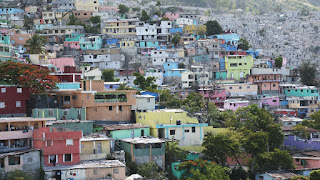Republic of NGOs
It is
difficult to overstate the challenges the people of Haiti have faced. During an
era of colonization in the 1600’s, for a period of time, 48,000 slaves each
year were sent into Haiti, each one facing an average life expectancy of just five
years. When Haiti finally became the first black republic in 1804, France
demanded an indemnity of $21 Billion which was paid off through 80% of Haitian
revenues for 100 years.
Today, the
average Haitian lives on $800 each year and 24% of the people live in extreme
poverty with only 17% having access to latrines. 92% of the schools are run by
non-state actors. The promise of democracy since 1990 has largely been
disappointing.
And then
in 2010, an earthquake was responsible for 220,000 deaths and almost 2 million
people were displaced from their homes. More than 90% of families lost a family
member in the earthquake.
When you
look at the history, says MCC Haiti country representative Paul Fast, “Perhaps
the appropriate question is how has Haiti done as well as it has?”
Post-earthquake,
Haiti has become the Republic of NGOs with more than 20,000 international
organizations working there. MCC is one of only 243 officially registered with
the government, but unlike many others, MCC has been working in Haiti for
almost 60 years. In the larger context, MCC is a very small player, but it is well
respected. MCC Haiti country representative Rebecca Fast even serves on a coordinating
committee for NGOs.
During the
earthquake, more than 300,000 homes in Haiti were destroyed. Through its
partner, ITECA (Institute of Technology and Animation), MCC has helped to
rebuild 80 homes in one community in Port-au-Prince.
Unlike many
of the rebuilding efforts in Haiti, ITECA helps people stay on the land where they
previously lived. While this has created a lot more work and cost, it has
helped guarantee a much greater level of success with the families. The rebuilt
homes cost under $15,000 each and ITECA has even begun manufacturing a new kind
of interlocking cinder block to build the homes. In six years, ITECA has
rebuilt 800 homes with 400 families still waiting.
ITECA
director Chenet Jean Baptiste told us, “It makes a great difference whether we
are building homes for people or with people.” He said that MCC has been
a good partner and a great friend of the community who cares about the dignity
of the people who are served. “MCC’s ideas and values match up with ours,” he said.
In the
community, ITECA takes time to build solidarity among communities and neighbors. “We
are helping people build homes, but ultimately, we are helping people build
community,” Jean Baptiste told us.
With ITECA
and other partners, MCC has helped to rebuild 900 homes and provided financial
assistance for thousands of families. Training in earthquake resistant construction,
trauma healing workshops and job skills training are other ways MCC has
responded to the earthquake.
In
addition, MCC has sent 38 shipments of blankets, food and school kits to Haiti valued at
more than $3 million. MCC staff told us that MCC canned meat has become a
valued brand and that the labels of the cans sometimes need to be torn off so that the they aren’t pilfered and resold.
Paul and
Rebecca Fast are new MCC Haiti country representatives and that has given them
an opportunity to view MCC’s work in a fresh way. They say MCC is well respected in
Haitian communities because of its long-term approach, its flexibility, its
insistence on working without armed guards and its willingness to serve communities
no one else is serving. They said the respect MCC has in communities is the
envy of other peer organizations.
Rebecca
said that future ideal projects would be ones that work with the Haitian
government and with local NGOs and that build up from the community.
One
morning MCC Haiti staff led us in an opening devotional from Psalm 133. Estere
Alveno, national staff administrator, told us that “the dew of Hermon which
falls on the mountains of Zion” is like God’s love coming fresh to us each day.
MCC staff
in Haiti are bearers of the love of Christ in the areas of relief, development
and peace building. How good and pleasant it is indeed when sisters and
brothers live together in harmony.
Ron Byler is executive director of MCC
U.S.








Comments
Post a Comment